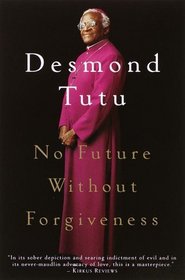"No Future Without Forgiveness" by Desmond Tutu is his personal account of his experience as the chairperson of South Africa's Truth and Reconciliation Commission. The TRC was established to make recommendations to Nelson Mandela on how to help South Africa, the country but more importantly its people, move forward after the dissolution of apartheid in the mid-1990's.
Within the framework of this historical effort, he writes with a directness that cannot be set aside. He shares details of extreme horrors committed in such a fashion which is both very sensitive and personal yet also speaks to global issues of how people, whether groups, nations, churches, or individuals, can easy fall into treating each other less than human.
And along side this sharing of experiences of horrific mistreatment, he shares the most uplifting tales of hope. Real experiences that hint at what appears to be Man's innate desire to be more than Himself - of hope, and forgiveness, which takes on a new and profound meaning within this context.
A brief yet poignant portion of the book that I found very thought provoking was the comparison of the approach that post-apartheid South Africa utilized with regards to reconciliation and reparations (which a large portion of the book addresses) compared to Jewish post-Holocaust.
Easy read. Thoughtful read. At 20 years removed from data of publication, the efforts and effects of the TRC in South Africa are still an example to be upheld. [4/5]
Within the framework of this historical effort, he writes with a directness that cannot be set aside. He shares details of extreme horrors committed in such a fashion which is both very sensitive and personal yet also speaks to global issues of how people, whether groups, nations, churches, or individuals, can easy fall into treating each other less than human.
And along side this sharing of experiences of horrific mistreatment, he shares the most uplifting tales of hope. Real experiences that hint at what appears to be Man's innate desire to be more than Himself - of hope, and forgiveness, which takes on a new and profound meaning within this context.
A brief yet poignant portion of the book that I found very thought provoking was the comparison of the approach that post-apartheid South Africa utilized with regards to reconciliation and reparations (which a large portion of the book addresses) compared to Jewish post-Holocaust.
Easy read. Thoughtful read. At 20 years removed from data of publication, the efforts and effects of the TRC in South Africa are still an example to be upheld. [4/5]
http://miasbooklist.blogspot.com/2007/08/no-future-without-forgiveness-by.html




